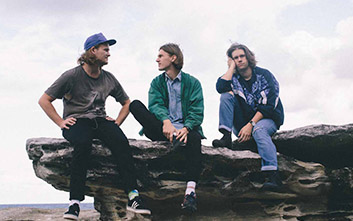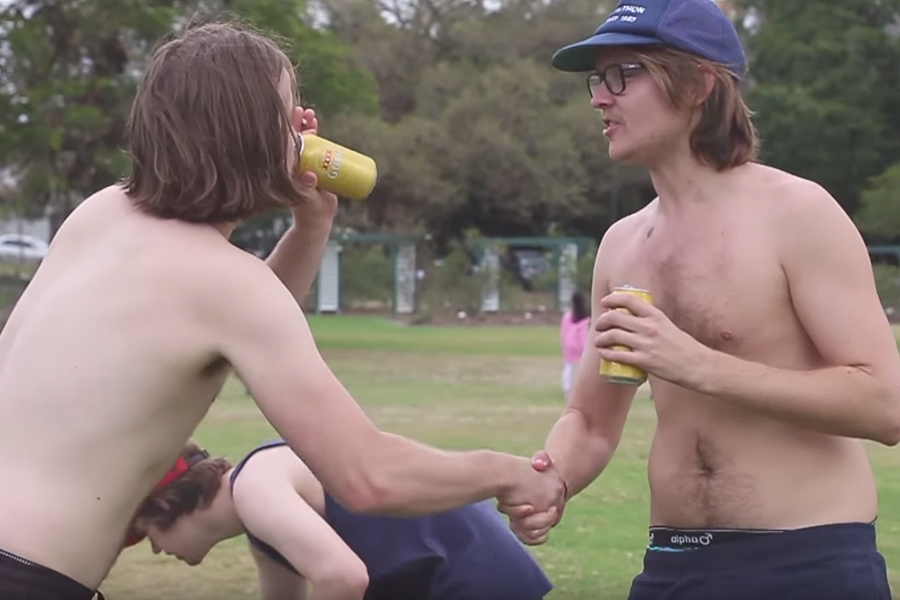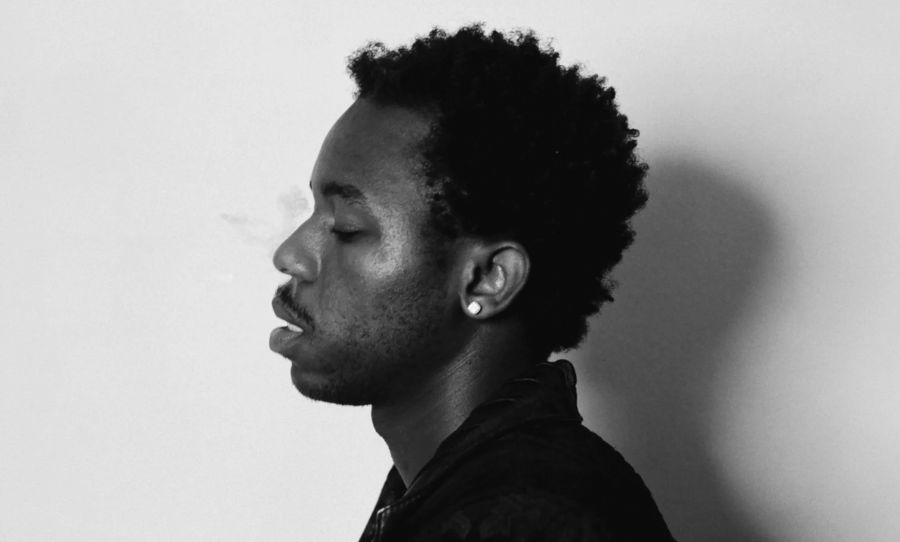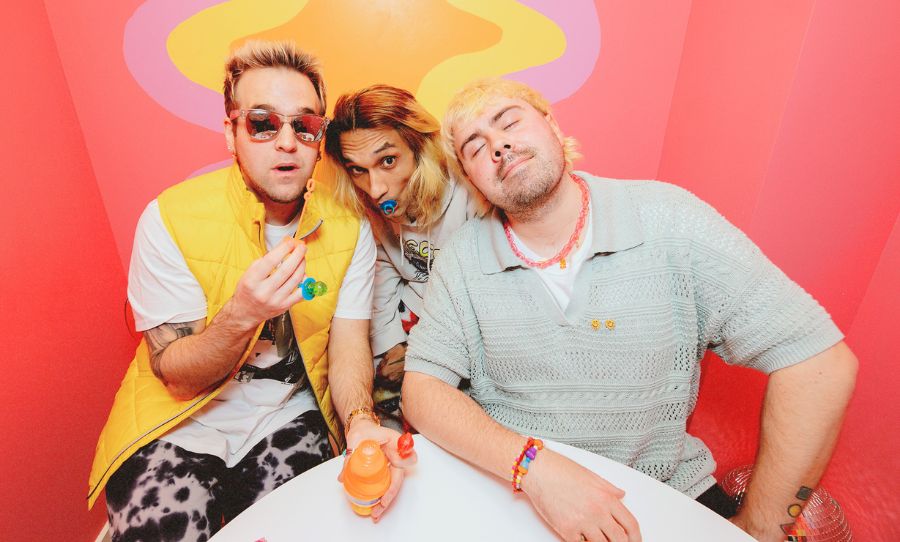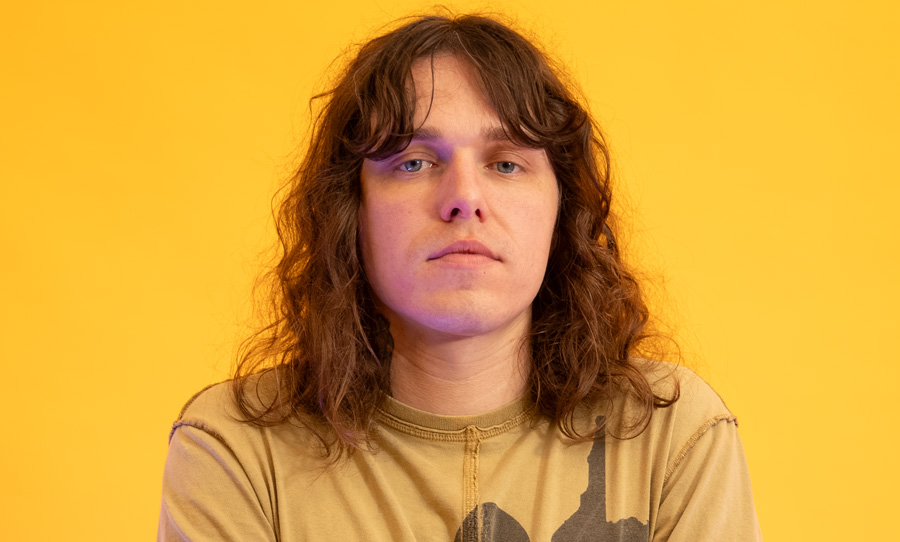Bundaberg ex-pats Good Boy have been building a steady following since the release of debut EP No Love For Back Home earlier this year. Texturing the lighter shades of The Go-Betweens with a raw rocking edge, No Love served as a surprisingly resonant introduction for the band.
Good Boy’s laid-back garage rock has Australia hooked with its’ endearing honesty, and we sat down together to see if the lads boasted the same down-to-earth flavor as their tunes.
Sitting around with Tom and Stu, we delved a little further into the band’s background, musical influences and future sonic direction.
HAPPY: You grew up sun-dazed Northern Queensland. Is there a part of that which feeds through to your music?
TOM: Not intentionally.
TOM: Yeah, not intentionally. I don’t think it has influenced our songwriting.
HAPPY: Some people say there’s a Brisbane sound…
TOM: I think there is definitely a Brisbane sound. People go after it.
STU: I think being around other Brisbane bands, some of that sound has come through to us.
HAPPY: There weren’t any bands in Bundaberg that influenced you?
TOM: It’s a little barren. I know DZ Deathrays are from around there, but they’re not really too similar to our sound.
STU: Not really, not during the time we were there.
HAPPY: There are plenty of scrappy licks and bouncy rhythms of Waste Days or Ease Your Temper. It sort of reminded me of 70s post punk, maybe with a bit of The Go-Betweens thrown in for good measure. Was there a particular group that inspired you to start Good Boy?
TOM: I think The Go-Betweens would be a big one.
STU: [Frontman] Rian is a huge Go-Betweens fan.
TOM: But I don’t know. Before Good Boy started I’d been writing riffs by myself for a long time. Rian and I knew each other for long time, then I…
STU: Rian and I played in another band together.
TOM: I just came to him and was like “what do you think of this riff?” It was Waste Days and he thought it was cool. Then we wrote five or six other songs, our first EP.
STU: In two weeks we sort of just did it, the songs came really easy.
TOM: I think that’s when we knew. I thought “This is easy, we’re not really trying that hard and we’re smashing these songs out!” Is it like that anymore?
STU: We’re a lot more critical now.
HAPPY: So you’re approach to making music has changed as you’ve developed as a band?
STU: I think before, when it came so easily, we had a system that worked. It was like “Here’s a verse and let’s put a chorus there then put in two more.”
TOM: And just jam off of that chorus. Because that’s something we do.
STU: Now we’re trying to make our songs which don’t sound like anything we’ve done. Stuff still comes easy but we pay a lot of attention to try and really refine it.
TOM: Yea, like not repeating structures or stuff like that. Trying to mix it up a little bit. But in saying that when we do write a song it usually doesn’t take that long. If it’s the structure we’ve jammed on, it’ll probably stay that way.
HAPPY: What influenced the group to relocate to Brisbane?
STU: All our mates kind of moved down together. It was move or be left behind by yourself.
TOM: It’s a bit like that in Bundaberg, there’s not much of a music scene there. If you want to play gigs and get known, you’ve got to move to Brisbane. Sure you can get big on the internet, but for us we had to gig.
HAPPY: Would you consider moving to a bigger city or is Brisbane a place that you’ve settled into?
TOM: I love Brisbane.
STU: Yeah, I really like it here. It’s a nice scene, a network.
TOM: It’s good when you can go to a gig and know everyone. The Brisbane scene is such a nice environment, everyone’s mates.
HAPPY: Some people have said that compared to Sydney or Melbourne it’s easier to experiment or do something weird. People are very supportive.
STU: Yeah.
TOM: I like that. It’s just a big community. In Sydney or Melbourne there’s lots of competition. I don’t know why it is but Brisbane is just more chilled out.
HAPPY: You’ve been touring fairly rigorously over the past year. What is the band dynamic like on the road? Do you get along?
TOM: The last tour we did was good. There weren’t many blues or anything.
STU: Yeah. There were seven of us on tour. That helped. If it had been just the three of us we would be bound to get a bit antsy. When there are seven people it’s easier to go away and do you own thing.
HAPPY: What was the last album you listened to and how would you rate it?
STU: I’ve been listening to a ton of The Rolling Blackouts Coastal Fever, but they don’t really have an album.
TOM: I would check Spotify but I’m scared that I’ve been listening to a lot of John Mayer.
STU: Honestly there’s a lot of pop music out there that I’m listening too.
HAPPY: Do you have a guilty pop pleasure?
STU: Elton John. I listen to him quite a bit….. Jet.
HAPPY: Jet was huge, but in hindsight they’ve been subject to a lot of criticism. What was it about their music that made people feel that way?
STU: A couple of their songs got absolutely thrashed on radio and in movies. Maybe it was the over exposure? The music was everywhere, it became a cliché.
HAPPY: Is that something you worry about with your own music?
STU: Hey, I’d love some royalties and some synch deals! But it’s not something we’re worried about at the moment.
HAPPY: No Love For Back Home is all about politics, heartache and wasted opportunity. Dark! You’ve already dropped first track Poverty Line, what else can people expect on the next EP?
STU: I’m definitely more excited for this next EP. The style of production will be similar, but in terms in lyrical content it’s all over the shop. There’s no single line of thought.
TOM: It’s still representative of what we play live. The progression of songs flows in nicely, it plays out like a live set.
